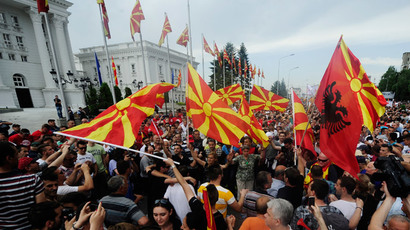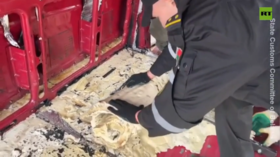‘Macedonian opposition outnumbered in grabbing power without violence & help from abroad’
The Macedonian opposition is well aware of the fact that they do not have enough popular support to come to power by legal means, so the only thing that remains for them to do is to get to it through violence, Stevan Gajic from the Belgrade Institute of European Studies told RT.
An anti-government protest in Macedonia’s capital entered is second day on Wednesday, with protesters ransacking the president’s office and demanding his resignation. The protest was sparked by the president’s decision to pardon politicians embroiled in a wiretapping scandal.
RT: Why has the president decided to halt the investigation?
Stevan Gajic: Macedonia has been destabilized since May of last year when a group of armed terrorists entered from Serbia, actually from Kosovo, the Albanian terrorists who killed eight policemen and a number of them were killed as well. After that came June and the attempt of a colored revolution by the opposition leader Zoran Zaev and his supporters, which didn’t succeed.
The government has an obvious majority of voters still, and they proved it in the street as well since they’ve organized a counter-protest, the protest that outnumbered the opposition protest.
After that came a long period of negotiations about the terms of elections that should be held. Both sides, both parties – opposition and the government – agreed that the elections should be held on April 25, and then they postponed it to the June 5, but the opposition is not satisfied. Actually, they are not satisfied because they know that they will lose the election, so they are using any kind of a political chance to organize a protest and, perhaps, get to the power by violent means.
RT: How far do you think these protesters are prepared to take their discontent?
SG: Well, I think this depends on the foreign factor, if we see who are the mediators of the opposition and government negotiations, it is the US ambassador, the representative of EU and so on and so forth; and they’ve already in a number of times and in this case as well condemned the government for using force. Now we can see on the streets of Macedonia that there’s a counter-protest of the supporters of the government and I think that this time this protest can be even more violent.
What we need to be aware of is the broader geopolitical context of what is going on in Macedonia. When we look at the map of the Balkans, Macedonia is right in the center of it, and recently there have been talks about the Chinese high-speed railway that should be constructed from Greece all the way to Warsaw; and also the Turkish Stream that was canceled for other reasons was about to pass the same territory. So, for sure, the United States is not happy about these projects because of all other major powers, first of all, Russia and China getting more stake in Balkans and in Europe as a whole.
MORE: Anti-govt protesters clash with police in Macedonian capital (Photo via @Marien__R) https://t.co/CNUaEt8fI5pic.twitter.com/nX16AGtKso
— RT (@RT_com) 13 апреля 2016 г.
RT: Skopje seems to have been in the news quite a lot over the past number of months in particular with discontent with the government. How widespread is the frustration with the state there?
SG: Well, there certainly is a level of frustration but the point is this is not the majority of Macedonian society. Macedonian society is an ethnically divided society, with a majority of Macedonians and a minority of Albanians. Albanians will always be dissatisfied because they want to join their mother state Albania, to separate the part of Macedonia. There was a rebellion in 2001 and a constant tension between the two sides.
But the Macedonian part of the society is divided, however, the majority of Macedonians, the great majority of Macedonians support the current government and the opposition is well aware of that, that with the Albanians and with their Macedonian supporters, they simply don’t have enough votes to get the power by legal means, and this is why we see that and they have supporters from abroad that are helping them in this.
‘Foreign mediators don’t change their playbook’
Mike Jones, editor of Culture Wars magazine, told RT that it is pretty clear that the discontent with the government is “instrumentalized” by foreign mediators, who prefer to cling to the previously-worked scenarios used to ignite colored revolutions.
RT: Why has the president decided to halt the investigation?
Mike Jones: The president probably halted it because he understood that he was playing into the hands of color revolution, I suspect that’s what is happening here. It has already earmarks of what happened in the Ukraine, what happened in Iran in 2009, all the way back to Iran in 1953. So, he probably saw that he was falling into a trap and made this decision, which might or might not be the right decision, but I think that’s the objective situation and he’s dealing with it.
RT: How far do you think these protesters are prepared to take their discontent?
MJ: Well, the measuring rod will be what happened in the Ukraine. What happened there is that protests got more and more violent, and then the right-wing descendants of the Bandera group opened fire on the wrong people. At this point they blamed it on the government: ‘The government is killing its own people and, therefore, we need some type of foreign intervention, the government needs to be overthrown.’ This is also what happened in Syria. It is pretty clear they don’t change their playbook here. So, in other words, the protest will have to become increasingly violent in order to bring about the desired result.
RT: How widespread is the frustration with the current government there?
MJ: I’ve no idea. How am I supposed to know? I’m in Indiana. They’re in Macedonia. I’m sure there’s discontent. There’s widespread discontent in the United States, there’s also widespread wiretapping in the United States. These are pikers in Macedonia, and we have way more than 20,000 people being wiretapped by the NSA of the United States. But the question is not whether there’s discontent, the question is who is instrumentalizing the discontent and what is the purpose here.
The statements, views and opinions expressed in this column are solely those of the author and do not necessarily represent those of RT.














